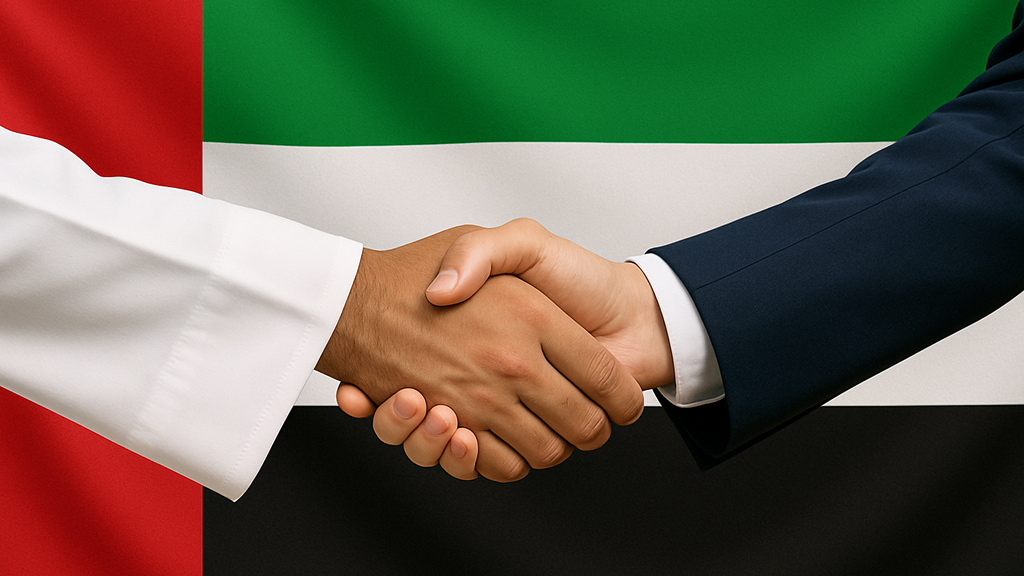
إعادة توطين الشركات إلى الإمارات العربية المتحدة
في السوق العالمي التنافسي اليوم، تقوم الشركات بنقل مقارها بنشاط إلى ولايات قضائية توفر كفاءة ضريبية ومرونة تنظيمية واتصالاً دولياً.
تتيح إعادة توطين الشركات إلى الإمارات العربية المتحدة للمؤسسات نقل موطنها القانوني إلى دولة الإمارات دون حل هيكلها الأصلي.
تتميز الإمارات العربية المتحدة بفرض ضريبة شركات اتحادية صفرية على العديد من القطاعات، وأكثر من 40 منطقة حرة صديقة للأعمال، ووصول مبسط إلى الأسواق العالمية. يستفيد آلاف الشركات الدولية كل عام من هذا التحول الاستراتيجي، مستغلين الاقتصاد المستقر للدولة والبنية التحتية العالمية.
أسباب إعادة توطين الشركات إلى الإمارات العربية المتحدة
تختار الشركات إعادة توطينها إلى الإمارات لأسباب استراتيجية ومالية وقانونية متنوعة. تشمل الدوافع الرئيسية ما يلي:

تقدم الإمارات معدل ضريبة شركات بنسبة 0% في العديد من القطاعات، إلى جانب العديد من معاهدات الازدواج الضريبي.

تضمن البيئة القانونية الشفافة في الإمارات الثقة طويلة الأمد للمستثمرين الدوليين.

موقعها بين أوروبا وآسيا وإفريقيا يجعلها مثالية للعمليات عبر الحدود.

تسمح معظم المناطق الحرة بملكية أجنبية بنسبة 100% دون الحاجة إلى كفيل محلي.

تسمح إعادة التوطين للشركات بالاحتفاظ بهويتها القانونية مع تغيير الولاية القضائية.
ميزات إعادة توطين الشركات في المنطقة الحرة
تسمح إعادة توطين الشركات في إحدى المناطق الحرة في الإمارات للشركات بمواصلة العمليات في ظل أنظمة ضريبية وتنظيمية مواتية دون تصفية. ومع ذلك، لا تقبل جميع المناطق الحرة تغيير الولاية القضائية. تدعم مناطق مثل مركز دبي للسلع المتعددة، ومركز دبي المالي العالمي، وسوق أبوظبي العالمي، ومدينة رأس الخيمة الاقتصادية، وسلطة المنطقة الحرة الدولية في الفجيرة ذلك ولديها إجراءاتها الخاصة بها.
تتطلب الأهلية عادةً ما يلي:
- وضع جيد في الولاية القضائية الأصلية.
- إذن بالهجرة الخارجية.
- نشاط تجاري متوافق مع تركيز المنطقة.
- مستندات موثقة بشكل صحيح (عقد التأسيس، قرارات مجلس الإدارة، إلخ).
تقدم كل منطقة مزايا مختلفة اعتمادًا على نوع عملك. فيما يلي مقارنة:
| منطقة حرة | التخصص | المزايا الضريبية | الجهة المنظمة | الأفضل لـ |
| مركز دبي للسلع المتعددة | السلع، التجارة | 0% ضريبة | سلطة مركز دبي للسلع المتعددة | التجار، شركات الخدمات |
| مركز دبي المالي العالمي | المالية، القانونية | 0% ضريبة | سلطة دبي للخدمات المالية | القانون، الملكية الخاصة، التكنولوجيا المالية |
| سوق أبوظبي العالمي | القابضة، إدارة الأصول | 0% ضريبة | هيئة تنظيم الخدمات المالية | الصناديق، الشركات القابضة |
| مناطق رأس الخيمة الاقتصادية | الصناعية واللوجستية | إعفاءات ضريبية | مناطق رأس الخيمة الاقتصادية | التصنيع، التصدير |
| هيئة المنطقة الحرة الدولية | الشركات الصغيرة والمتوسطة، التكنولوجيا | 0% ضريبة | هيئة المنطقة الحرة الدولية | الشركات الناشئة، التجارة الإلكترونية |
للاطلاع على خيارات المناطق التفصيلية، انظر: تأسيس الشركات في المناطق الحرة بدبي..
فوائد انتقال الشركات إلى الإمارات العربية المتحدة
تقدم إعادة توطين الشركات إلى الإمارات مزايا متعددة:

0% ضريبة دخل في معظم المناطق؛ أكثر من 130 معاهدة ضريبية.

بوابة استراتيجية إلى آسيا وأوروبا وإفريقيا.

ملكية أجنبية 100% وإعادة كاملة لرأس المال.

انتقل دون حل كيانك الحالي.

بيئة تنظيمية موثوقة وشفافة.

احتفظ بالهوية المؤسسية والعقود وتاريخ التأسيس.
هذه الفوائد تجعل إعادة توطين الشركات استراتيجية مقنعة للشركات العالمية.
الإطار القانوني لإعادة توطين الشركات في الإمارات العربية المتحدة والمتطلبات التنظيمية
يتشكل الأساس القانوني لإعادة توطين الشركات في الإمارات العربية المتحدة بشكل أساسي من خلال لوائح كل منطقة حرة أو سلطة برية فردية. لا يوجد قانون اتحادي واحد بشأن إعادة التوطين؛ بدلاً من ذلك، يحكم الإطار القانوني للشركات المطبق على الولاية القضائية المختارة (على سبيل المثال، قانون مركز دبي المالي العالمي رقم 5 لعام 2018لوائح شركات سوق أبوظبي العالمي، لوائح شركات مركز دبي للسلع المتعددة).
لبدء إعادة التوطين، يجب على الشركة أن تثبت أن ولايتها القضائية الأم تسمح بالهجرة الخارجية وأن الشركة في وضع قانوني جيد. تتطلب المناطق الحرة قرارًا رسميًا من مجلس إدارة الشركة يوافق على الانتقال، إلى جانب رأي قانوني يؤكد أن إعادة التوطين مسموح به بموجب قوانين بلد المنشأ. قد تشمل المتطلبات الإضافية تعيين وكيل مسجل، والتحقق من هيكل الملكية المستفيدة، وتلبية أي معايير ترخيص خاصة بالصناعة.
يقوم المسجل في الإمارات العربية المتحدة بعد ذلك بتقييم الطلب، وعند الموافقة، يصدر شهادة استمرارية. فقط بعد ذلك، يعتبر الكيان قد تم إعادة توطينه رسميًا. تطلب السلطات أيضًا من الشركة إلغاء تسجيلها في ولايتها القضائية السابقة وتقديم دليل على ذلك خلال فترة محددة.
تختلف الإجراءات الإدارية والجداول الزمنية لكل منطقة حرة اختلافًا طفيفًا، مما يجعل خدمات إعادة توطين الشركات في الإمارات العربية المتحدة ضرورية للتنقل القانوني الدقيق والامتثال.

اللوائح الضريبية
أحد أقوى الحوافز لإعادة توطين الشركات في الإمارات العربية المتحدة هو المشهد الضريبي للولاية القضائية. لطالما حافظت الإمارات على سمعتها كولاية قضائية ذات ضرائب منخفضة مع اتفاقيات ضريبية دولية واسعة النطاق.
تتمتع الشركات العاملة داخل المناطق الحرة المؤهلة بضريبة دخل شركات بنسبة 0%، شريطة تلبية متطلبات الجوهر الاقتصادي. خارج المناطق الحرة أو لقطاعات معينة، قد تطبق ضريبة شركات بنسبة 9% اعتبارًا من يونيو 2023، ولكن فقط على الأرباح التي تتجاوز 375.000 درهم إماراتي. تظل الأرباح الموزعة وأرباح رأس المال والدخل من مصادر أجنبية معفاة من الضرائب في معظم الحالات.
لا توجد ضريبة دخل شخصية للمقيمين والمغتربين. علاوة على ذلك، لا تفرض الإمارات العربية المتحدة ضريبة استقطاع على الأرباح الموزعة أو الفوائد أو الإتاوات، ولا تطبق قيودًا على الصرف. وهذا يجعل إعادة الأرباح سلسة وفعالة من حيث التكلفة.
وقد وقعت الدولة أكثر من 130 معاهدة ازدواج ضريبي، مما يسمح للشركات بتجنب فرض الضرائب على نفس الدخل في بلدان متعددة. قد تستفيد الشركات التي تم إعادة توطينها من الوصول إلى المعاهدات اعتمادًا على الهيكل القانوني والجوهر الاقتصادي.
تُفرض ضريبة القيمة المضافة بنسبة 5% على معظم السلع والخدمات، ويُطلب من الشركات التي تتجاوز عتبة 375.000 درهم إماراتي في حجم الأعمال التسجيل. ومع ذلك، تعتمد قابلية تطبيق ضريبة القيمة المضافة على نوع الخدمات وموقع العميل، لا سيما بالنسبة للمعاملات عبر الحدود.
عملية إعادة توطين الشركات خطوة بخطوة
يتضمن نقل الشركة إلى الإمارات العربية المتحدة المراحل التالية:
- 01
التقييم القانوني الأولي للتحقق من الأهلية في كلتا الولايتين القضائيتين.
- 02
صياغة قرار مجلس الإدارة بالموافقة على الانتقال.
- 03
الحصول على موافقة مسجل الولاية القضائية الأصلية.
- 04
إعداد المستندات الموثقة، بما في ذلك شهادة التأسيس وعقد التأسيس والنظام الأساسي وشهادات حسن السيرة.
- 05
تقديم الطلب إلى المنطقة الحرة أو السلطة البرية المختارة.
- 06
الموافقة وإصدار شهادة الاستمرارية في الإمارات العربية المتحدة.
- 07
إلغاء التسجيل من البلد الأصلي لإتمام عملية النقل.
للحصول على الإرشاد وتخفيف المخاطر، تستعين العديد من الشركات بدعم الخبراء طوال العملية.
عروض إعادة التوطين لدينا
التحديات والاعتبارات في إعادة توطين الشركات
بينما يقدم انتقال الشركات إلى الإمارات مزايا استراتيجية، يجب أخذ العديد من التحديات في الاعتبار:
- الحواجز القانونية: لا تسمح جميع الولايات القضائية بإعادة توطين الشركات. في مثل هذه الحالات، قد تكون هناك حاجة إلى التصفية وإعادة التأسيس.
- التوافق التنظيمي: يجب أن يتوافق النشاط التجاري مع نطاق المنطقة الحرة المستهدفة. قد تتطلب بعض المناطق تعديلات على التراخيص أو موافقات إضافية.
- الوثائق والامتثال: الأخطاء في التوثيق أو الترجمات أو الآراء القانونية يمكن أن تؤخر العملية أو تبطلها.
- الآثار الضريبية في بلد المنشأ: قد تنطبق ضرائب الخروج أو فقدان مزايا المعاهدات اعتمادًا على الولاية القضائية.
- الجدول الزمني والتنسيق: يتطلب نقل الموطن تنسيقًا دقيقًا بين إلغاء التسجيل والاستمرارية لتجنب الفجوات التشغيلية.
يمكن للتخطيط السليم والاستشارة تخفيف هذه المخاطر وضمان انتقال سلس.
كيف تسهل خدماتنا إعادة توطين الشركات بسلاسة
آي تي أيه لاستشارات الأعمال تقدم استشارات خدمات إعادة توطين الشركات في الإمارات العربية المتحدة من الألف إلى الياء، مما يضمن الامتثال التنظيمي الكامل والحد الأدنى من الاضطراب التشغيلي. يدعم فريقنا المتخصص العملاء في كل مرحلة من خلال:

الاستشارات والتخطيط المتخصص.
الدعم الشامل للوثائق.
التواصل مع السلطات والهيئات التنظيمية.
سواء كنت تفكر في إعادة توطين الشركات في دبي، أو إعادة التوطين في الإمارات العربية المتحدة، أو خدمات نقل أوسع في دبي، فإن حلولنا المخصصة تقلل التعقيد وتضمن استمرارية الأعمال على المدى الطويل
للمتخصصين
بخبرة تزيد عن عقد من الزمان وأكثر من 1.500 مشروع ناجح، تعد آي تي أيه لاستشارات الأعمال شريكك الموثوق به للتخطيط الضريبي الدولي ونقل الأعمال. يتعاون فريقنا المكون من أكثر من 200 خبير مع أكثر من 150 بنكًا دوليًا عبر 40 ولاية قضائية، مما يوفر حلولًا مالية مخصصة وإرشادات استراتيجية.
سيرشدك فريقنا ذو الخبرة خلال كل خطوة من عملية إعادة التوطين، مما يضمن هيكلة عملك لتحقيق أقصى قدر من الاستفادة من الظروف التنظيمية والاقتصادية المواتية في دبي. سواء كنت شركة ناشئة أو مؤسسة راسخة، فإننا نقدم حلولاً مخصصة لتلبية متطلباتك الفريدة ودفع النمو المستدام.
من التخطيط الأولي إلى التنفيذ النهائي، نتأكد من أن انتقال عملك إلى الإمارات العربية المتحدة سلس ومتوافق تمامًا. اتصل بنا اليوم لتكتشف كيف يمكننا تسهيل إعادة توطين شركتك بنجاح ودعم نموها في هذا السوق الديناميكي.
الأسئلة الشائعة حول إعادة توطين الشركات في الإمارات العربية المتحدة
لا، فقط الشركات من الولايات القضائية التي تسمح قانونًا بإعادة التوطين يمكنها نقل موطنها إلى الإمارات العربية المتحدة.
عادة، تستغرق من 4 إلى 8 أسابيع حسب الولاية القضائية الأصلية والمنطقة الإماراتية المختارة.
لا. تحافظ إعادة التوطين على الهوية القانونية والتاريخ والعقود للكيان الأصلي.
ليس بالضرورة. تسمح العديد من المناطق الحرة بالمعالجة عن بُعد من خلال وكلاء مرخصين أو ممثلين قانونيين.
غالباً ما تحصل قطاعات التمويل والتجارة والخدمات الرقمية والخدمات اللوجستية وهياكل الشركات القابضة على أكبر الفوائد الضريبية والتشغيلية.



